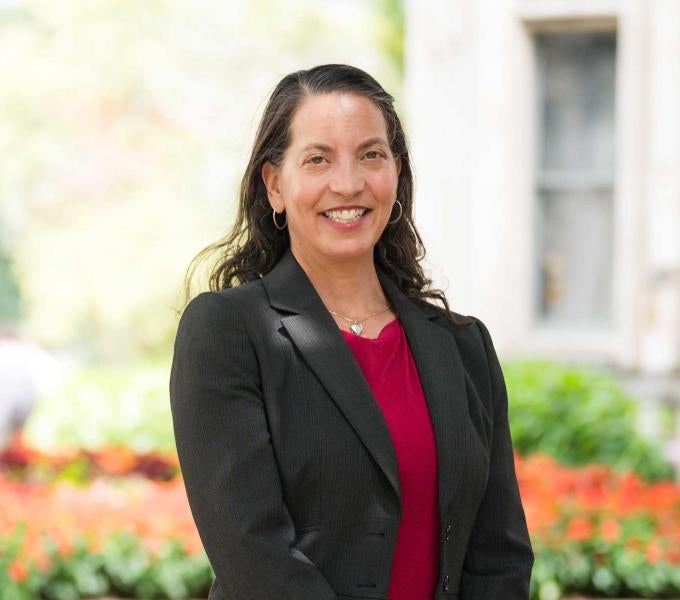Philip Hallen Chair in Community Health and Social Justice, Professor, and PhD Program Director
Professor Sara Goodkind earned a PhD in social work and sociology, a graduate certificate in women’s studies, and an MSW, all from the University of Michigan, as well as a BA in sociology from Amherst College. Her primary appointment is in the School of Social Work, and she holds affiliated appointments in the Department of Sociology and the Gender, Sexuality, and Women’s Studies Program.
Dr. Goodkind is a critical feminist scholar whose work examines the structural roots of what are often perceived as individual-level problems. Specifically, much of her scholarship focuses on social service programs and systems that work with young people, concentrating on young people’s experiences in educational, child welfare, and juvenile legal systems and how these systems both construct and address the needs of the young people they serve. Dr. Goodkind’s research examines institutional and systemic inequities, tracing young people’s pathways through systems and providing evidence and recommendations for systems and policy change. Dr. Goodkind developed her research interests through her work with young people as a teacher, mentor, facilitator, and social worker, and she is engaged in collaborative community-engaged research and advocacy aimed at effecting systemic change.
Dr. Goodkind and Dr. Kathi Elliott, CEO of Gwen’s Girls, are the inaugural recipients of the Society for Social Work and Research’s Community-Research Partnership Award, in recognition of their long-term community-engaged research and activism. They are alums of the Robert Wood Johnson Foundation’s Interdisciplinary Research Leaders program, which supported their collaborative work with Dr. Britney Brinkman in developing the Black Girls Advocacy and Leadership Alliance.
Dr. Goodkind serves as co-president of WSW, the corporate advisory board for the journal Affilia: Feminist Inquiry in Social Work, for which she was co-editor-in-chief with Drs. Mimi Kim and Jennifer Zelnick from 2020-2023.
With Ghadah Makoshi, Dr. Goodkind is co-convener of the Black Girls Equity Alliance Juvenile Justice Action Team. The BGEA is focused on eradicating inequities affecting Black girls in Allegheny County, and the juvenile justice action team is coordinating collaborative efforts aimed at creating community and system change to keep our young people out of legal systems.
Dr. Goodkind is co-principal investigator of the Pittsburgh Wage Study, which documents the experiences of low-wage workers and the impacts of unionization and wage increases on their and their families’ well-being. This longitudinal, mixed-methods study is aimed at generating understanding to support policy makers, advocates, and employers in ensuring that all workers are paid a living wage and have safe, supportive working conditions.
Research Interests
- Juvenile legal system
- Economic, racial, and gender justice
- Feminist praxis
- Participatory research with young people
- Community-engaged research
Representative Publications
Ballentine, K. B., Thyberg, C., Schleitwiler, T., Tillman, H., Shook, J., & Goodkind, S. (Forthcoming). What happens when the fight for $15 and a union is won? Understanding workers’ perceptions and implications for organizing. Social Service Review.
Woo, J., Shook, J., Tillman, H., Vang, H., & Goodkind, S. (Forthcoming). Unionization in healthcare: Examining working conditions and worker mental health outcomes in hospital settings. Labor Studies Journal.
Shook, J. J., Goodkind, S., Ballentine, K. L., Kim, S., Woo, J., Engel, R., Tillman, H., & Schleitwiler, T. (2023). Using research to build power: The Pittsburgh Wage Study. Journal of Community Practice, 31(3-4), 488-508.
Ballentine, K., Goodkind, S., & Shook, J. (2022). How low-paid parents navigate the complex financial landscape of benefits cliffs and disincentive deserts. Health Affairs, 41(12), 1707-1714.
Goodkind, S., Kim, M. E., Zelnick, J., Bay-Cheng, L. Y., Beltrán, R., Diaz, M., Gibson, M. F., Kanuha, K., Harrell, S., Moulding, N., Mountz, S., Sacks, T. K., Simon, B., Toft, J., & Walton, Q. L. (2021). Critical feminisms: Principles and practices for feminist inquiry in social work. Affilia, 36(4), 481-487.
Goodkind, S., & Bay-Cheng, L. Y. (2021). Are my pants lowering your test scores? Blaming girls and girls’ empowerment for the “boy crisis” in education. Youth & Society, 53(5), 745-763.
Goodkind, S., Brinkman, B., & Elliott, K. (2020). Redefining resilience and reframing resistance: Empowerment programming with Black girls to address societal inequities. Behavioral Medicine, 46(3-4), 317-329.
Goodkind, S., Shook, J. J., Kolivoski, K., Pohlig, R., Little, A., & Kim, K. H. (2020). From child welfare to jail: Mediating effects of juvenile justice placement and other system involvement. Child Maltreatment, 25(4), 410-421.
Goodkind, S., & Ballentine, K. (2017). Feminist social work and political engagement: Working toward social justice through local policy. Affilia, 32(4), 425-431.
Goodkind, S. (2013). Single-sex public education for low-income youth of color: A critical theoretical review. Sex Roles, 69(7/8), 393-402.
Goodkind, S., Schelbe, L., Joseph, A., Beers, D., & Pinsky, S. (2013). Providing new opportunities or reinforcing old stereotypes? Perceptions and experiences of single-sex public education. Children and Youth Services Review, 35(8), 1174-1181.
Goodkind, S., Shook, J. J., Kim, K. H., Pohlig, R., & Herring D. (2013). From child welfare to juvenile justice: Race, gender, and service experiences. Youth Violence and Juvenile Justice, 11(3), 249-272.
Goodkind, S., Schelbe, L., & Shook, J. J. (2011). Why youth leave care: Understandings of adulthood and transition successes and challenges among youth aging out of child welfare. Children and Youth Services Review, 33(6), 1039-1048.
Goodkind, S., Wallace, J. M., Jr., & Shook, J. J. (2009). Are girls really becoming more delinquent? Testing the convergence hypothesis for girls’ and boys’ delinquency by race/ethnicity, 1976-2005. Children and Youth Services Review, 31(8), 885-895.
Goodkind, S. (2009). “You can be anything you want, but you have to believe it”: Commercialized feminism in gender-specific programs for girls. Signs, 34(2), 397-422.
Goodkind, S. (2005). Gender-specific services in the juvenile justice system: A critical examination. Affilia, 20(1), 52-70.
